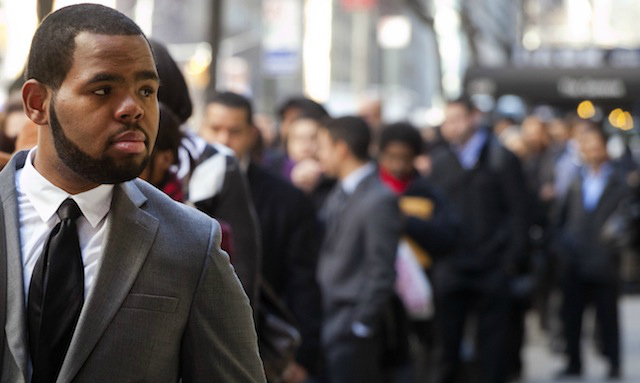 The Black unemployment rate fell to a five-year low in November, according to the latest jobs report by the Labor Department, but economists saw little to celebrate as Congress inaction threatens the federal unemployment insurance programs that helps millions of families.
The Black unemployment rate fell to a five-year low in November, according to the latest jobs report by the Labor Department, but economists saw little to celebrate as Congress inaction threatens the federal unemployment insurance programs that helps millions of families.
The unemployment rate for Blacks fell to 12.5 percent last month the lowest since December 2008 when it was 11.9 percent. In January 2009, the same month President Obama started his first term the rate jumped to 12.6 percent.
The unemployment rate for Whites ticked down from 6.3 percent in October to 6.2 percent in November.
The unemployment rate for Black men over 20 also improved dropping from 13 percent in October to 12.3 percent in November. The jobless rate for White men fell from 6.2 percent in October to 6 percent in November. The jobless rate for Black women fell from 11.5 percent in October to 11.1 percent in November, compared to White women that saw their unemployment rate fall from 5.5 percent in October to 5.3 percent in November.
Black youth between 16-19 years old continue to suffer the worst unemployment rate at 35.8 percent. The unemployment rate for White youth in the same age group was 18.6 percent in November.
The economy added 203,000 jobs last month.
“What this report shows is that the economy continues to grow at a very tepid pace,” said Bernard Anderson, an economist and professor emeritus of the Wharton School at the University of Pennsylvania in Philadelphia. “The economy is not growing at a rate that will reduce the overhang of long-term unemployment.”
Economists fear that Congress won’t act to extend federal unemployment insurance benefits, a move that could stifle job growth in 2014.
“For lawmakers to not be considering extending [unemployment insurance] means that they are really not looking at what’s happening in the economy and they think that things are better than they are,” said Elise Gould, the director of health policy research at the Economic Policy Institute.
Gould continued: “What’s often missed in these discussions is that these unemployment payments to people actually provide stimulus for the economy. Without [the benefits] the labor market will actually lose more jobs in 2014.”
Chad Stone, chief economist at the Center on Budget and Policy Priorities, agreed.
In a blog on the center’s website, Stone wrote: “Despite improvements this year, the labor market is still not strong enough for policymakers to let emergency federal unemployment insurance (UI) expire as scheduled during Christmas week.”
According to CBPP, the long-term unemployment rate has never been higher than 1.3 percent when the federal unemployment insurance program ended after past recessions. The current long-term unemployment rate is 2.6 percent. More than 4 million people have been looking for work longer than six months.
If Congress allows the emergency federal unemployment insurance (UI) to lapse, Stone wrote: “That means more hardship for the families of workers who are still struggling to find a job, and it also means that families that lose EUC will have less to spend. Reduced spending, in turn, will hurt the recovery and slow job creation.”
Those hardships would be disastrous for the families of Black workers, who continue to endure higher levels of unemployment than White workers.
The number of Black workers either employed or looking for work fell from 60.7 percent in October to 60.6 percent in November, compared to White workers who saw an uptick in their labor force participation rate from 63 percent in October to 63.1 percent in November. A decrease in the labor force can make the unemployment rate look better than it does on the ground.
“In general, nothing has changed in the relative economic position of African Americans relative to Whites in November compared to what it was in October,” said Anderson. “I don’t see anything to shout about. I guess one can be happy that the African American unemployment rate didn’t go up, but the unemployment rate didn’t go up for anybody.”
Anderson continued: “African Americans have a relationship with the American economy similar to the caboose on the train. When the train speeds up, the caboose speeds up, and when the train slows down, the caboose slows down, but in the natural order of things, the caboose never catches up with the engine. That’s what these numbers show you.”
